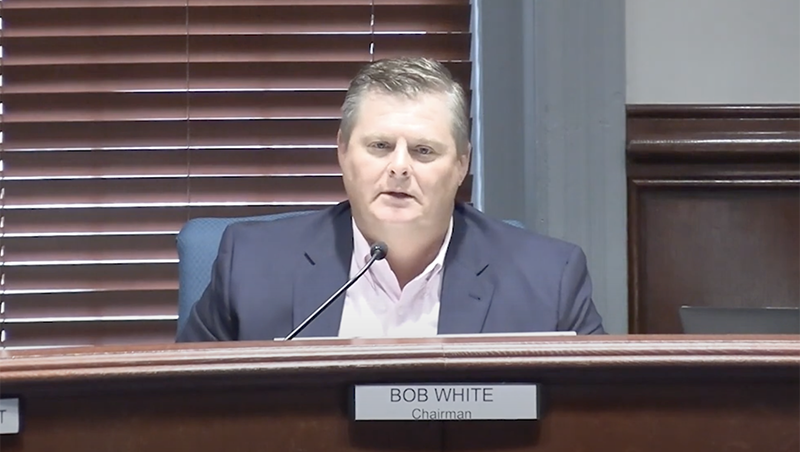Currituck commissioners discuss rezoning
Published 4:03 pm Tuesday, April 23, 2024

- Currituck County Board of Commissioners Chairman Bob White explains the effect on citizens of the recent ruling by the N.C. Court of Appeals regarding the county’s use of occupancy tax. Currituck County video still
Currituck commissioners had a full agenda at their April 1 meeting, moving quickly through five public hearings on the topics of rezoning, HOAs and multi-family standards.
Before the public hearings, Chairman Bob White made a statement to the public about the N.C. Court of Appeals lawsuit that the county recently lost against the Corolla Civic Association regarding the county’s spending of occupancy tax.
The court ruled on March 19 that the county cannot spend occupancy tax on public safety expenses because those expenses are not tourism related.
The county transferred $6.2 million from occupancy tax to the general fund to augment the sheriff’s department and pay overtime for extra deputies.
“It wasn’t transferred to the General Fund just willy nilly to use on any governmental purpose. It had a specific tag associated with it,” said White. “I bring that up because we cannot create a special tax district to deal with sheriff’s department and the ramp up in the extra deputies we need in Corolla. This is going to have a direct tax implication on Currituck County and we are going to have to look at adding more tax to the fire district in Corolla.”
He summarized, “For the folks in Corolla, you can expect to hear from us about a tax increase.”
The county attorney confirmed that the county plans to petition the Supreme Court for a discretionary review of the ruling.
The board then moved on to conduct five public hearings.
The first was a request for a conventional rezoning of 48 acres from General Business Zoning District to Agriculture Zoning District for property located at 7972 Caratoke Highway in Powells Point.
Though this is technically considered a downzoning, there are certain uses that are allowed in agricultural zoning, including solar farms and sand mines.
Applicant Jane Gallop Newbern said she is unsure what her family plans to do with the property once it’s rezoned, but said one possibility is a family subdivision. Her son will determine its future use, she said.
Several community members expressed disapproval of the rezoning.
“I just want to remind y’all of the multiple conversations we’ve had over this past year regarding this very thing right here. Rezoning has brought us to many problems that we see today,” said James Mims. “I think we’re looking at the very opportunity … to stand by what multiple of you have said – is that we will commit to no rezonings that may bring solar farms, etc. into Currituck County.”
Though either zone would allow for development, commissioners ultimately ended up denying the request because of the uncertainty of the development and the ambiguity of the outcome of the request.
Selina Jarvis made a motion to deny the request, along with commissioners Kitty Etheridge, Mike Payment and White.
Commissioner Owen Etheridge, who opposed Jarvis’ motion, said that in his history on the board, there’s never been a downzoning request that’s been denied.
The motion to deny the request was approved. In other words, the applicant’s request to rezone her property was denied.
White told the applicant that her son could return to the board at a later time with a more specific plan and request a rezoning in the future. “It’s the uncertainty that has basically caused this quandary this evening,” White said.
The second public hearing came from Ashbrook Estates, LLC, with a request for an amendment to the Future Land Use Map from O-2 Reserved Lands to G-1 Low Density Growth for 130.73 acres located off Maple Road, in Crawford Township, adjacent to the Maplewood subdivision.
A new Land Use Map would restructure the way lot size is determined, reducing the applicant’s allowable lots from 52 to 50. After some discussion and public comments all opposing the greater number of lots, commissioners voted 4-2 (with Jarvis and Kitty Etheridge opposing) to allow 52 lots, which was the number that was allowed when the property was purchased.
The third public hearing was tabled, but was scheduled to return to commissioners for a vote at the mid-month meeting. Mark Bissell of Bissell Professional Group requested an amendment to the Unified Development Ordinance (UDO) that would improve the process of transferring maintenance responsibilities from a developer to a homeowners’ association.
Currently, developers are responsible to maintain a subdivision’s common areas until that responsibility is transferred to the HOA. However, the transfer process is lengthy and arduous, resulting in some HOAs going years before accepting full responsibility.
“At some point [HOAs] need to take control of their own destiny,” Bissell said. “If you have an active HOA that has been properly funded, they shouldn’t have to rely on the developer for years and years to do these ongoing maintenance activities.”
The amendment states that the transfer must be completed by the time 100% of the lots have been sold.
Commissioners expressed interest in approving the request, but suggested clarifying the language, including edits to make sure that the developers retain ownership of the roadways until DOT has accepted the road for maintenance.
Commissioners planned to return to the amendment request at their April 15 meeting after staff had incorporated some suggested changes.
Next, commissioners held a public hearing to consider an amendment to the UDO that would remove the multi-family design requirement that requires a two-foot minimum finished floor elevation above established grade.
Commissioners asked staff to create the amendment after a request from Saga-owned Monteray Shores community.
The planning board recommended denial of the request because they thought the elevation requirement had value, including aesthetic appeal.
White made a motion to approve the amendment, but directed county staff to come back to the board with designs standards that would supplement what would have been attained with a two-foot elevation requirement.
The motion passed, with Jarvis and Kitty Etheridge opposing.
The final public hearing was a request to reestablish dimensional standards for existing lots and minor subdivisions in the Agriculture and Single Family Residential-Mainland Zoning Districts.
Last September, with the approval of a zoning text amendment, the board approved an amendment that inadvertently deleted the standards for these existing lots. The standards were reestablished, with one change: setbacks were increased from 20 feet to 50 feet for all lots approved after September 5.
The request was approved unanimously.
Finally, in new business, commissioners voted to add a member to the Tourism Advisory Board from the Currituck County Game Commission. This will be a non-voting alternate member, except in the case that a quorum is not met; in that circumstance the game commissioner will have voting privileges.
SUBSCRIBE TO THE COASTLAND TIMES TODAY!





